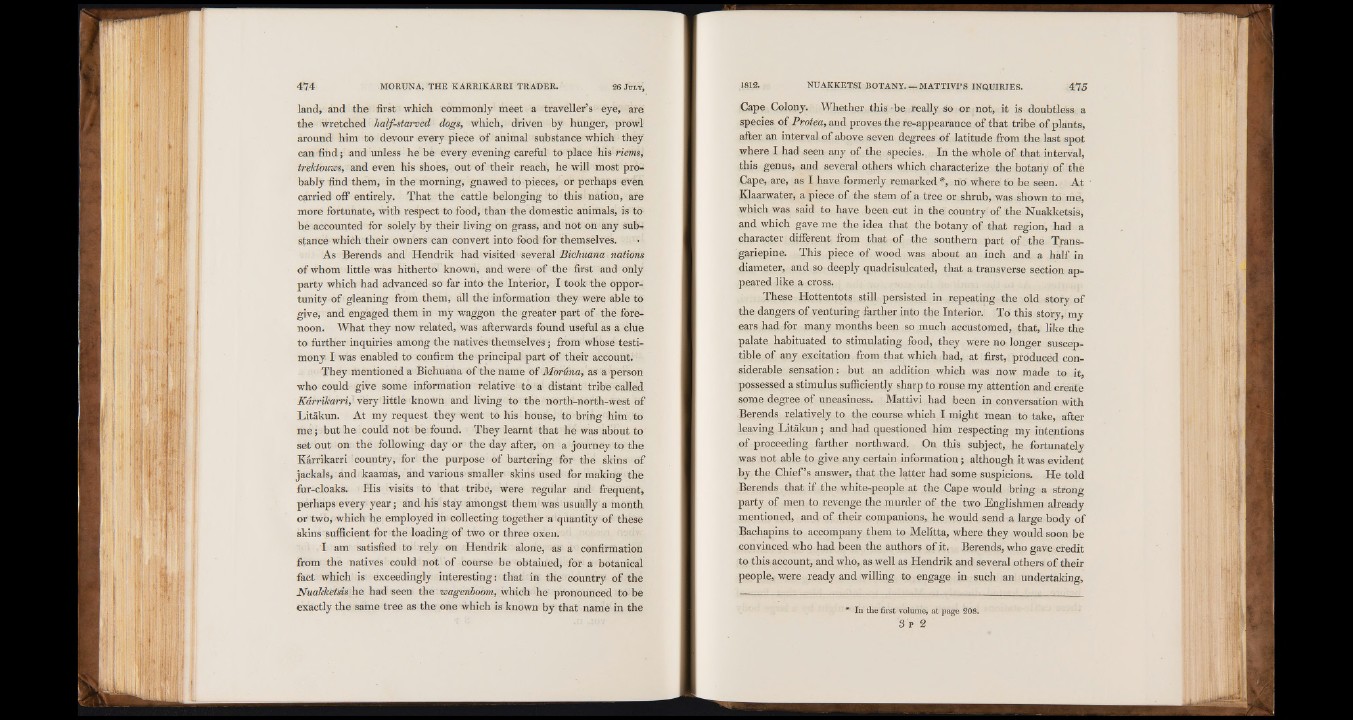
land, and the first which commonly meet a traveller’s eye, are
the wretched half-starved dogs, which, driven by hunger, prowl
around him to devour every piece of animal substance which they
can find; and unless he be every evening careful to place his riems,
trehtouws, and even his shoes, out of their reach, he will most probably
find them, in the morning, gnawed to pieces, or perhaps even
carried off entirely. That the cattle belonging to this nation, are
more fortunate, with respect to food, than the domestic animals, is to
be accounted for solely by their living on grass, and not on any substance
which their owners can convert into food for themselves. >
As Berends and Hendrik had visited several Bichuana nations
of whom little was hitherto known, and were of the first and only
party which had advanced so far into the Interior, I took the opportunity
of gleaning from them, all the information they were able to
give, and engaged them in my waggon the greater part of the forenoon.
What they now related, was afterwards found useful as a clue
to further inquiries among the natives themselves; from whose testimony
I was enabled to confirm the principal part of their account.
They mentioned a Bichuana of the name of Moruna, as a person
who could give some information relative: to a distant tribe called
Karrikarri,! very little known and living to the north-north-west of
Litakun. At my request they went to his house, to bring him to
m e; but he could not be found. They learnt that he was about to
set out on the following day or the day after, on a journey to the
Karrikarri country, for the purpose of bartering for the skins of
jackals, and kaamas, and various smaller skins used for making the
fur-cloaks. His visits to that tribe, were regular and frequent,
perhaps every year; and his stay amongst them was usually a month
or two, which he employed in collecting together a quantity of these
skins sufficient for the loading of two or three oxen.
I am satisfied to rely on Hendrik alone, as a confirmation
from the natives could not of course be obtained; for a botanical
fact which is exceedingly interesting: that in the country of the
Nuakketsis he had seen the wagenboom, which he pronounced to be
exactly the same tree as the one which is known by that name in the
Cape Colony. Whether this be really so or not, it is doubtless a
species of Protea, and proves the re-appearance of that tribe of plants,
after an interval of above seven degrees of latitude from the last spot
where I had seen any of the species. In the whole of that interval,
this genus, and several others which characterize the botany of the
Cape, are, as I have formerly remarked *, no where to be seen. At
Klaarwater, a piece of the stem of a tree or shrub, was shown to me,
which was said to have been cut in the country of the Nuakketsis,
and which gave me the idea that the botany of that region, had a
character different from that of the southern part of the Trans-
gariepine. This piece of wood was about an inch and a half in
diameter, and so deeply quadrisulcated, that a transverse section appeared
like a cross.
These Hottentots still persisted in repeating the old story of
the dangers of venturing farther into the Interior. To this story, my
ears had for many months been so much accustomed, that, like the
palate habituated to stimulating food, they were no longer susceptible
of any excitation from that which had, at first, produced considerable
sensation: but an addition which was now made to it,
possessed a stimulus sufficiently sharp to rouse my attention and create
some degree of uneasiness. Mattivi had been in conversation with
Berends relatively to the course which I might mean to take, after
leaving Litakun ; and had questioned him respecting my intentions
of proceeding farther northward. On this subject, he fortunately
was not able to give any certain information; although it was evident
by the Chief’s answer, that the latter had some suspicions. He told
Berends that if the white-people at the Cape would bring a strong
party of men to revenge the murder of the two Englishmen already
mentioned, and of their companions, he would send a large body of
Bachapins to accompany them to Melitta, where they would soon be
convinced who had been the authors of it. Berends, who gave credit
to this account, and who, as well as Hendrik and several others of their
people, were ready and willing to engage in such an undertaking,
* In the first volume, at page 208.
3 p 2